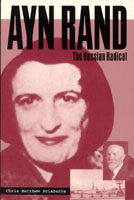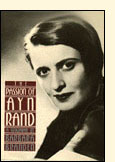
Alice O'Connor, better known by her pen name Ayn Rand, was a Russian-born American author and philosopher. She is known for her fiction and for developing a philosophical system she named Objectivism. Born and educated in Russia, she moved to the United States in 1926. After two early novels that were initially unsuccessful and two Broadway plays, Rand achieved fame with her 1943 novel The Fountainhead. In 1957, she published her best-selling work, the novel Atlas Shrugged. Afterward, until her death in 1982, she turned to non-fiction to promote her philosophy, publishing her own periodicals and releasing several collections of essays.
Objectivism is a philosophical system named and developed by Russian-American writer and philosopher Ayn Rand. She described it as "the concept of man as a heroic being, with his own happiness as the moral purpose of his life, with productive achievement as his noblest activity, and reason as his only absolute".

Leonard Sylvan Peikoff is a Canadian American philosopher. He is an Objectivist and was a close associate of Ayn Rand, who designated him heir to her estate. He is a former professor of philosophy and host of a nationally syndicated radio talk show. He co-founded the Ayn Rand Institute (ARI) in 1985 and is the author of several books on philosophy.
This is a bibliography for Ayn Rand and Objectivism. Objectivism is a philosophical system initially developed in the 20th century by Rand.
David Christopher Kelley is an American philosopher. He is a professed Objectivist, though his position that Objectivism can be revised and influenced by other schools of thought has prompted disagreements with other Objectivists. Kelley is also an author of several books on philosophy and the founder of The Atlas Society, an institution he established in 1990 after permanently dissociating with Leonard Peikoff and the Ayn Rand Institute.
The Atlas Society (TAS) is an American 501(c)(3) nonprofit organization that promotes the philosophy of Ayn Rand. It is part of the Objectivist movement that split off from the Ayn Rand Institute in 1990 due to disagreements over whether Objectivism was a "closed system" or an "open system". David Kelley is the founder of TAS, and Jennifer Grossman is its current CEO.
The Nathaniel Branden Institute (NBI), originally Nathaniel Branden Lectures, was an organization founded by Nathaniel Branden in 1958 to promote Ayn Rand's philosophy of Objectivism. The institute was responsible for many Objectivist lectures and presentations across the United States. Many of those associated with NBI worked on the Objectivist magazines, The Objectivist Newsletter and The Objectivist.

Isabel Paterson was a Canadian-American libertarian writer and literary critic. Historian Jim Powell has called Paterson one of the three founding mothers of American libertarianism, along with Rose Wilder Lane and Ayn Rand, who both acknowledged an intellectual debt to Paterson. Paterson's best-known work, The God of the Machine (1943), a treatise on political philosophy, economics, and history, reached conclusions and espoused beliefs that many libertarians credit as a foundation of their philosophy. Her biographer Stephen D. Cox (2004) believes Paterson was the "earliest progenitor of libertarianism as we know it today." In a letter of 1943, Rand wrote that "The God of the Machine is a document that could literally save the world ... The God of the Machine does for capitalism what Das Kapital does for the Reds and what the Bible did for Christianity."
The Objectivist movement is a movement of individuals who seek to study and advance Objectivism, the philosophy expounded by novelist-philosopher Ayn Rand. The movement began informally in the 1950s and consisted of students who were brought together by their mutual interest in Rand's novel, The Fountainhead. The group, ironically named "The Collective" due to their actual advocacy of individualism, in part consisted of Leonard Peikoff, Nathaniel Branden, Barbara Branden, Alan Greenspan, and Allan Blumenthal. Nathaniel Branden, a young Canadian student who had been greatly inspired by The Fountainhead, became a close confidant and encouraged Rand to expand her philosophy into a formal movement. From this informal beginning in Rand's living room, the movement expanded into a collection of think tanks, academic organizations, and periodicals.

Ayn Rand's philosophy of Objectivism has been, and continues to be, a major influence on the right-libertarian movement, particularly libertarianism in the United States. Many right-libertarians justify their political views using aspects of Objectivism.
Ralph Raico was an American libertarian historian of European liberalism and a professor of history at Buffalo State College.

The Virtue of Selfishness: A New Concept of Egoism is a 1964 collection of essays by the philosopher Ayn Rand and the writer Nathaniel Branden. Most of the essays originally appeared in The Objectivist Newsletter. The book covers ethical issues from the perspective of Rand's Objectivist philosophy. Some of its themes include the identification and validation of egoism as a rational code of ethics, the destructiveness of altruism, and the nature of a proper government.

Erika Holzer was an American novelist and essayist who was a close associate of Ayn Rand. Her novel Eye for an Eye was the basis for a major motion picture of the same name. She also co-authored two nonfiction books with her husband, professor of law Henry Mark "Hank" Holzer.

Atlas Shrugged is a 1957 novel by Ayn Rand. It is her longest novel, the fourth and final one published during her lifetime, and the one she considered her magnum opus in the realm of fiction writing. She described the theme of Atlas Shrugged as "the role of man's mind in existence" and it includes elements of science fiction, mystery and romance. The book explores a number of philosophical themes from which Rand would subsequently develop Objectivism, including reason, property rights, individualism, libertarianism and capitalism, and depicts what Rand saw as the failures of governmental coercion. Of Rand's works of fiction, it contains her most extensive statement of her philosophical system.

Ayn Rand: The Russian Radical is a 1995 book by Chris Matthew Sciabarra tracing the intellectual roots of 20th-century Russian-American novelist and philosopher Ayn Rand and the philosophy she developed, Objectivism.

The Passion of Ayn Rand is a biography of Ayn Rand by writer and lecturer Barbara Branden, a former friend and business associate. Published by Doubleday in 1986, it was the first full-length biography of Rand and the basis for the 1999 film of the same name starring Helen Mirren as Rand.

Journals of Ayn Rand is a book derived from the private journals of the novelist and philosopher Ayn Rand. Edited by David Harriman with the approval of Rand's estate, it was published in 1997, 15 years after her death. Some reviewers considered it an interesting source of information for readers with an interest in Rand, but several scholars criticized Harriman's editing as being too heavy-handed and insufficiently acknowledged in the published text.

Ayn Rand and the World She Made is a 2009 biography of Russian-American philosopher Ayn Rand by Anne C. Heller.

Letters of Ayn Rand is a book derived from the letters of the novelist and philosopher Ayn Rand. It was published in 1995, 13 years after Rand's death. It was edited by Michael Berliner with the approval of Rand's estate.
Jennifer Burns is an American historian, serving as an Associate Professor of History at Stanford University and as a research fellow at the Hoover Institution. She previously served as assistant professor of history at the University of Virginia from 2007-2012. Burns works at the intersection of political, cultural and intellectual history.












